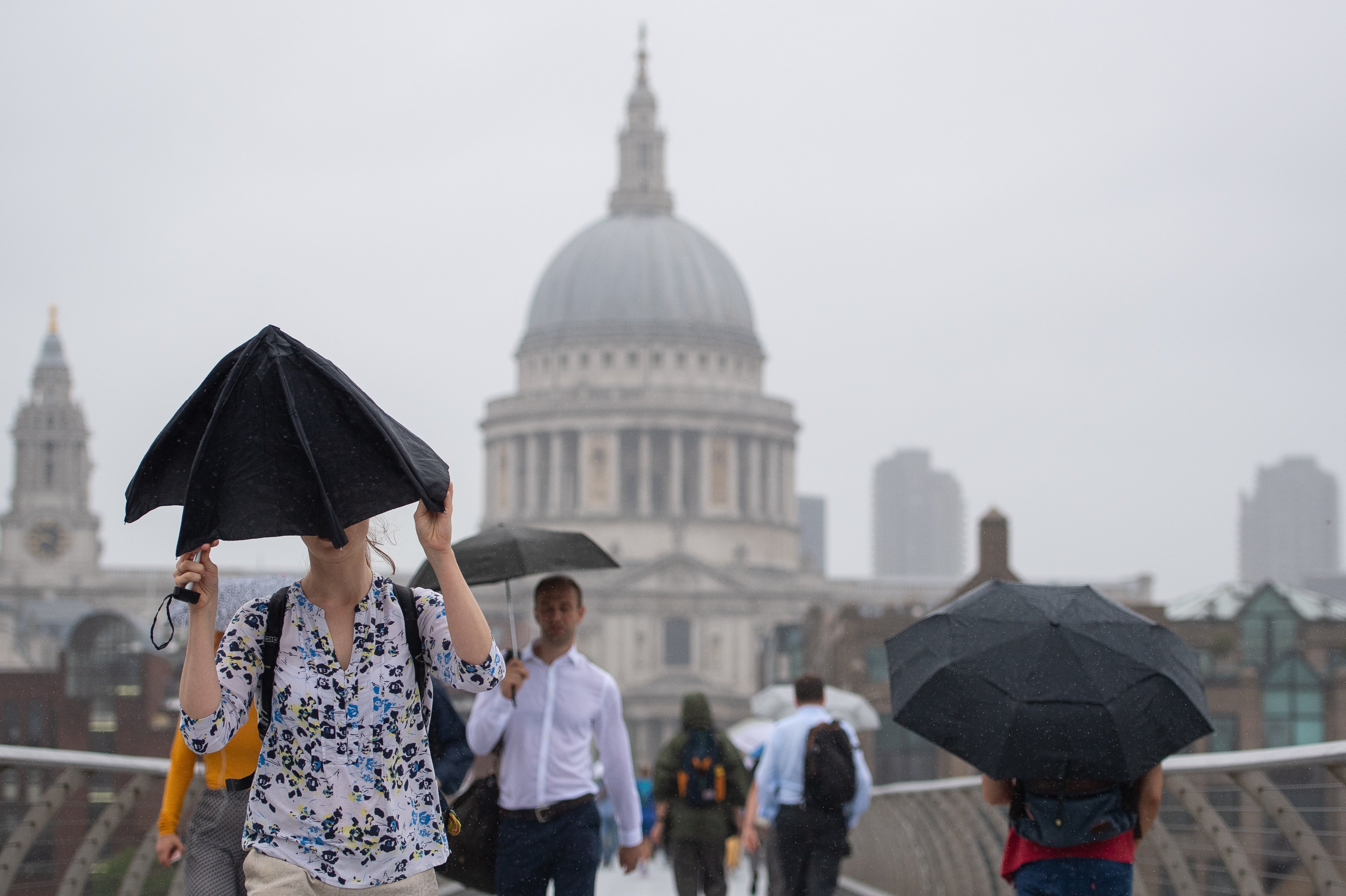Sadiq Khan tells Londoners to prepare for risk of flash flooding from heavy rain
Experts have warned that city drainage systems may not be able to cope if a sudden downpour hits.

Your support helps us to tell the story
From reproductive rights to climate change to Big Tech, The Independent is on the ground when the story is developing. Whether it's investigating the financials of Elon Musk's pro-Trump PAC or producing our latest documentary, 'The A Word', which shines a light on the American women fighting for reproductive rights, we know how important it is to parse out the facts from the messaging.
At such a critical moment in US history, we need reporters on the ground. Your donation allows us to keep sending journalists to speak to both sides of the story.
The Independent is trusted by Americans across the entire political spectrum. And unlike many other quality news outlets, we choose not to lock Americans out of our reporting and analysis with paywalls. We believe quality journalism should be available to everyone, paid for by those who can afford it.
Your support makes all the difference.Sadiq Khan has told Londoners to prepare for flash flooding in the event that heavy rain and thunderstorms hit the capital this week.
The Met Office has issued a yellow thunderstorm warning for most of the UK on Monday and Tuesday as conditions could cause flash flooding, transport disruption and power cuts in areas hit by heavy rain.
The weather warning will stay in place for southern England on Wednesday, where communities could be cut off by flooded roads, and the chance of fast-flowing or deep flood water could cause danger to life.
We learned a lot from last year in July when there was flash flooding caused by a huge amount of rain
Experts warned that city drainage systems may not be able to cope if a sudden downpour hits as water would likely run off land that has dried up over weeks of little rain and hot weather.
The National Drought Group on Friday moved parts of the South West, parts of southern and central England, and the East of England into official drought status, while six water companies have imposed or announced plans to impose hosepipe restrictions.
Speaking to PA on Monday, the Mayor of London said: “We learned a lot from last year in July when there was flash flooding caused by a huge amount of rain – two months’ worth of rain – in just a couple of hours and people’s homes businesses and public transport was flooded.
“Speaking to the Met Office, the Environment Agency and many others, we are concerned that over the next few days we could see a huge amount of rain in a short period of time which could lead to flash flooding.
“I have written to tens of thousands of Londoners who live in homes that could be affected by flash flooding.
“My message to Londoners is to please contact Floodline, go to your local authority’s website to see what you can do to reduce the chances of you being flooded but also to minimise the consequences on you,” he said, recommending people also check they are insured and what those details are as well as preparing a grab bag.
Mr Khan said: “[We are] working closely with the water companies, the fire brigade, Transport for London, local councils and other partners making sure we are as ready as we can be, but the bad news is there could well be flash floods if there’s heavy rain during a short period of time.”
The mayor also called on the Government to do more to tackle climate change as well as adapt the capital to deal with its consequences in light of the recent surge in fires and now the potential for flash floods.
“I’m really concerned about the ability not just of the fire brigade but our city to deal with what is now becoming a regular event of heatwaves, droughts and flash flooding,” Mr Khan said.
He also said he is “really worried about all forms of life in London,” including public transport systems not being as effective when temperatures exceed 35-40C and that homes and workplaces need to be adapted as well.
“I don’t want Londoners to be lulled into a false sense of security because we’ll still be living in a situation where the grass isn’t green so there’s still the possibility, even though there may be heavy rainfall, of grass fires, of open fires, of the drought carrying on in the foreseeable future with the hosepipe ban – even though it may rain later this week,” he added.
Water tends to find the lowest pathway... that is why it is of concern to the Tube and underground car parks
Prof Hannah Cloke, an expert in hydrology at the University of Reading, earlier explained why surface area floods are dangerous in cities.
“If you get a heavy rain in a city, the drainage system can cope up to a point, but if there is really heavy rain it can overwhelm the system – the rain cannot run away quick enough,” Prof Cloke said.
She also explained that if parks are “really really dry” there is no where for the water to run.
“Water tends to find the lowest pathway – that is why it is so dangerous for cities with these surface area floods. That is why it is of concern to the Tube and underground car parks and things like that.”
On why heavy rain would not alleviate these drought-hit areas, she said: “It’s a drop in the ocean really. It is not soaking into the soil which is how we really need it. We need it back into the system where it can be stored.
“We really need a long winter of rain to replenish this.”